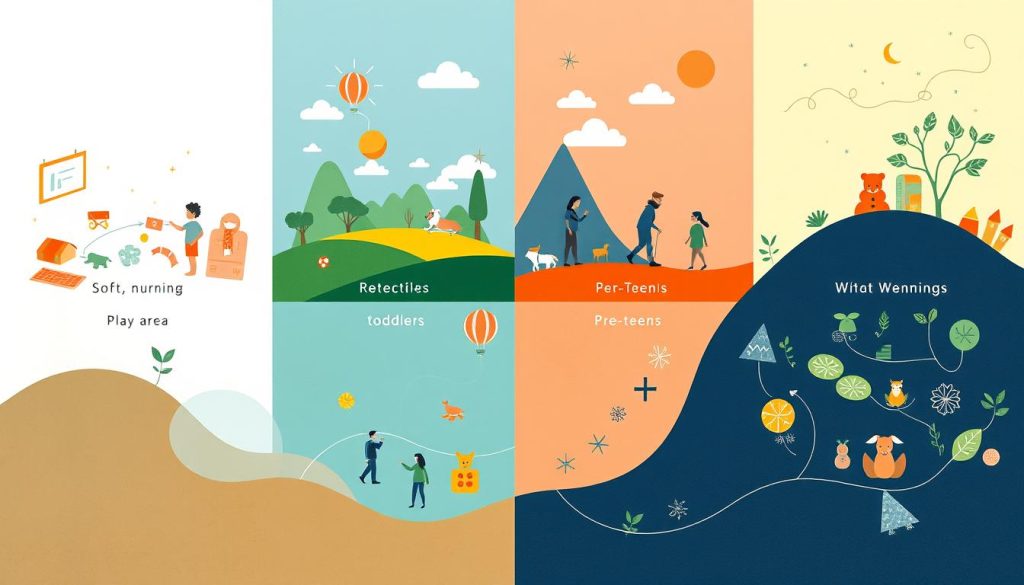Are you ready to talk about suicide with your child? It’s a tough conversation, but it’s becoming more common. Suicide is a big problem among young people, and even kids as young as six or seven might think about it. But, talking about it can actually help and start important family talks.
Donna McCutchen, a Licensed Clinical Social Worker (LCSW), says starting these talks is key. In places like Utah, where suicide is a big issue for kids, it’s important to talk about feelings early. With 22% of high school students thinking about suicide, parents need to have honest talks about mental health.
How do you talk about suicide with your child, no matter their age? It’s important to use strategies that fit their age. Talking together can make it easier, letting you adjust based on your child’s level of understanding. Starting these talks early helps your child know they can always come to you when they’re feeling down.
Key Takeaways
- Suicide is the second leading cause of death among young people ages 10-24.
- Research shows that discussing suicide with kids does not increase suicidal behavior.
- Donna McCutchen, LCSW, underscores the importance of early conversations about emotional well-being.
- Craft age-appropriate strategies for different developmental stages to address the topic naturally.
- Encourage open communication to help your child feel comfortable discussing their feelings.
Understanding the Importance of the Conversation
Talking openly about suicide is key to improving mental health and preventing suicide. It lets kids share their feelings and face their fears in a safe place. Experts from CHOC and others say it’s vital to clear up myths about this topic.
By discussing suicide, kids learn to turn to trusted adults in tough times. This is far from planting bad ideas in their heads.

Why Talking About Suicide Matters
Talking about suicide has many benefits. It helps kids understand their emotions, develop social skills, and build trust. These talks boost their confidence, empathy, and self-awareness.
They also help kids feel supported and know they’re not alone. The pandemic has shown how important these talks are to reduce stress and burnout.
Debunking Myths: Does Talking Increase Risk?
Many think talking about suicide might make kids want to do it. But studies prove the opposite. Talking about it can actually prevent it.
It gives kids a chance to share their feelings and get help early. Healthy talks can also break down harmful stereotypes kids might pick up early.
By tackling myths, you help kids feel empowered to ask for help when they need it. Experts suggest starting conversations with specific questions that fit the child’s level of understanding.
It’s also important to use open body language and not judge. Creating a safe space is crucial, whether it’s one-on-one time or family therapy.
By using these strategies, we can help kids deal with emotional challenges better. This way, we create a healthier, more supportive future for them.
Age-Appropriate Strategies for Different Developmental Stages
It’s key to know the different stages of development when talking about tough topics like suicide. Tailoring your words to a child’s age makes the conversation clear and meaningful.

Conversation Tips for Young Children
For young kids, keep it simple. Explain feelings by using examples they can get, like feeling “sick inside” when sad. Use easy words and let them share their feelings. Explain death in a way they can understand, and offer ways to feel better.
The first five years, especially from birth to three, are vital for learning to talk. So, talk, read, and sing with them often.
Addressing Middle Schoolers’ Concerns
Middle schoolers start to grasp more complex feelings and ideas. They might also face challenges related to being a middle child. Talk to them about mental health, like depression, in a way they can understand.
Let them know big emotional changes are normal. Show them there’s help available when they need it.
Talking to Teens About Suicide
Talking to teens requires understanding their unique stage and emotional changes. Discuss depression and mental health openly. Make sure they know they’re not alone and help is available.
Encourage them to talk about their feelings. This creates a safe space for them to open up and seek help.
Parenting Challenges: Creating a Safe Environment for Discussion
Creating a safe space for talks is key, especially for mental health. Gentle parenting means making a caring area where kids can share their feelings. This is especially important in stepchild relationships, where trust and openness can be hard to build.
Families dealing with divorce and children face extra challenges in talking openly. It’s vital to offer reassurance and stability. By making a safe space for talks, parents can help kids share honestly. This makes it easier to spot and tackle serious issues like suicidal thoughts and depression.
Image can support visitor interest and relevance:

A family-focused approach means understanding and tackling each family’s unique challenges. This might include managing money, time, or emotional issues. Giving parents the right info, skills, and resources helps them handle these challenges well.
Good communication is also crucial. Parents should use different ways to talk, like phone calls, emails, and meetings. This ensures they’re reachable and supportive. It also helps spot early signs of trouble, so they can act fast and prevent bigger problems.
Finally, early intervention is very important. Tackling issues early helps prevent bigger problems and keeps kids safe. This not only keeps kids’ mental health strong but also builds stronger family bonds and trust.
Recognizing Warning Signs and Providing Support
It’s key to spot warning signs of suicide early, like withdrawal or talking about death. Over 44 million Americans face mental health issues yearly, including kids and teens. If a child seems sad or withdrawn for more than two weeks, they might need help.
This help could include ways to support kids with anxiety or tackle childhood eating disorders.
In younger kids, signs can be poor school work, nightmares, or being too worried. Older kids might show trouble coping, changes in sleep or eating, or even using drugs. About 9.5% of tweens and teens have anxiety, and 4.5% of teens deal with depression.

Talk openly with your kids about their feelings and any suicidal thoughts. Have plans ready and know emergency numbers, like the 988 Suicide & Crisis Lifeline. Also, don’t hesitate to reach out to school counselors or mental health professionals if you see warning signs of suicide.
Online family therapy can also help. It’s a safe space for parents and kids to share feelings. It’s great for tackling anxiety and eating disorders. Since most teens use social media daily, it’s important to know their online world and its effects on their mental health.
If you notice big changes in your child, like after a family split or bullying, act fast. Offering emotional support and keeping communication open is crucial for your child’s happiness.
Conclusion
Talking about suicide with your kids is key in today’s world. It helps clear up myths and lets kids share their feelings. This way, you build a strong, supportive family bond.
Being a good parent is very important. It shapes your child’s feelings and thoughts. Studies show kids do better when parents are involved and supportive. This helps kids feel safe and manage their emotions better.
It’s also important to involve dads in parenting. Research shows dads play a big role in kids’ emotional growth. By being involved, you help your child grow up healthy and strong. Always remember, getting help when you need it is crucial for your family’s well-being.
FAQ
Why is it essential to discuss suicide with children?
Will talking about suicide with my child increase the risk?
How should I approach the topic with young children?
What different strategies should I use for middle schoolers?
How can I effectively discuss suicide with my teenager?
What are some of the challenges in creating a safe environment for these discussions?
How can I recognize potential warning signs of suicide in my child?
What support can I provide to a child showing signs of anxiety or depression related to suicide?
How does fostering open communication about mental health benefit the family dynamic?
Are there mental health resources available to help me talk to my child about suicide?
This post contains affiliate links. If you click on a link and make a purchase, I may earn a small commission — at no extra cost to you. Thank you for supporting this blog and helping me keep the patterns free! Read the full Affiliate Disclosure & Transparency.
